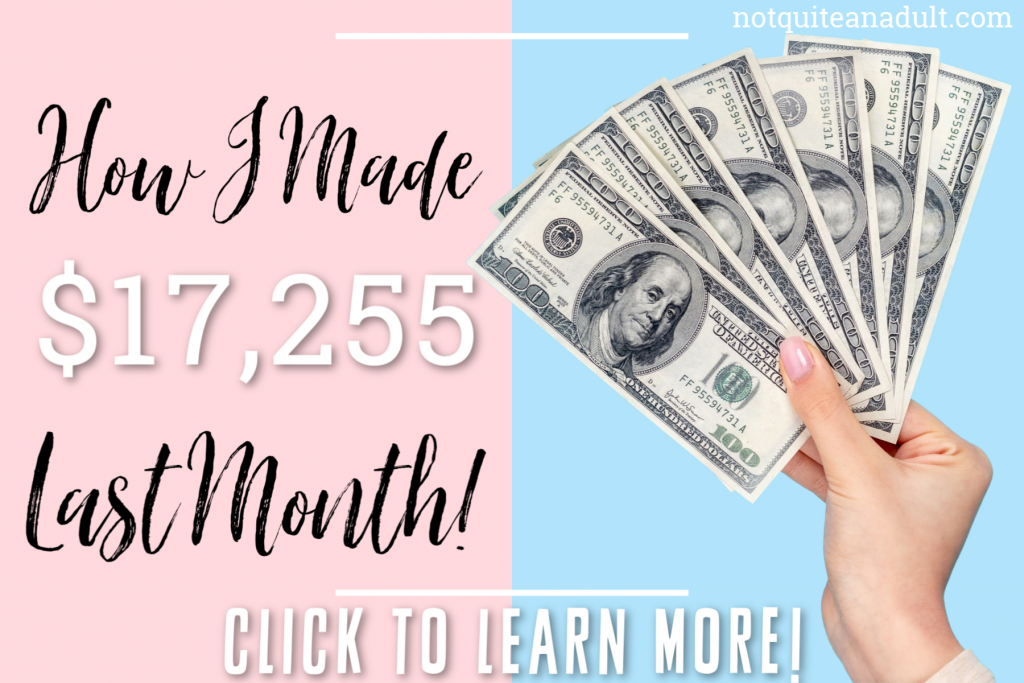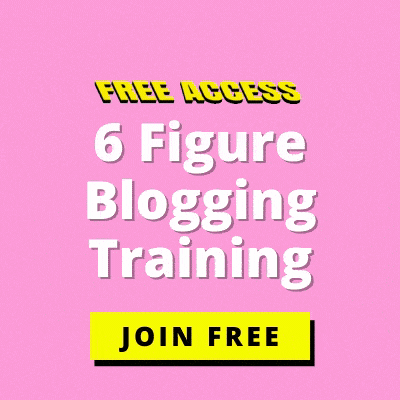There are hundreds of articles out there talking about ways to pay off debt and what to do when you’re working through it, but there aren’t many people talking about the things you should do before paying off debt.
Being in debt is one of the scariest and most overwhelming things because it’s so hard to know where you should start to get out of that situation.
A massive amount of debt can be soul-crushing and can really effect your day to day mental health.
Following these steps and going through this process can make your debt payoff process go a lot more smooth and can benefit your journey.
18 Things You Should Do Before Paying Off DebT

1. Add Up Your Totals
One of the scariest parts of going into a debt payoff journey is actually figuring out how much debt you’re in. It’s definitely a lot easier to just ignore the total number and pay off some individual debts before ever knowing how deep in debt you are.
Most people need to have that shock and awe moment when they feel like almost throwing up from seeing that number. It’s an extremely scary but also motivating moment.
When you go through and figure out how much debt you have, you should write this number down somewhere that you will see it daily. This will help you remember why you’re cutting down your expenses and what you’re working for.
2. Decide How You’re Going To Do It
When people think about paying off their debt, they think that the entire process is just throwing money at their debt until they’re gone. However, it’s best if you have an actual debt payoff method that is organized and can help guide you through the process.
There are two main ways that you can pay off your debt that are most popular, the debt snowball, and the debt avalanche. Choosing a debt payoff method is a personal decision based on how your brain works, so you should do your research on both methods before making a decision.
Personally, I recommended using the debt snowball because it’s based on keeping you motivated and eliminating small amounts of debt quickly.
3. Create a Budget
Budgeting is the most important thing for you to do when you finally decide to pay off your debt. Of course, it is possible for you to get it done without having a budget, but it’s going to take you years longer and be much less organized than if you have one.
There are a number of methods you can choose to use for your budget, like the 50/30/20 Budget or the Zero Based Budget. Both of these are awesome options, however, I would suggest a zero based budget because it will make a plan for every single penny that you earn.
If you don’t create a budget before you start paying off debt, you’ll be much more likely to throw money at things that you don’t need to throw money at and spend in places that are unnecessary.
4. Eliminate Unnecessary Expenses
Something you need to do to pay off debt is go through your monthly expenses and realize what things you don’t need to buy to survive. This is things like going into Target and buying everything in the store except for the one thing you actually needed.
Or buying snacks at the gas station because you didn’t plan ahead properly for your day.
There are a ton of items that you should stop buying that you can easily cut from your monthly spending and you won’t really notice that much of a difference in your day to day life.
5. Track Your Credit Score
A really important aspect of personal finance is your credit score, this three digit number lets lenders know how likely you are to repay a loan. You need to make sure that you’re aware of your credit score during this process and making sure that there are no inaccuracies on your credit report that can hut you in the future.
A great way to do this is to use a service called Credit Sesame that let’s you track your credit score entirely for free and will monitor it for you and let you know if anything pops up. This is an essential part of paying attention to your personal finances!
6. Stop Using Credit Cards
Since you have debt, it’s safe to assume that some of that is credit card debt. If you manage to ignore every other step on this list, please stop using credit cards!
There are some people out there who are amazing at using credit cards, and use them effectively to benefit them. They pay them off, don’t carry a balance, and are able to earn rewards. They never let their credit card balance get them into debt.
If you have credit card debt, I’d say it’s safe to assume that you aren’t one of those people. You don’t need to be using credit cards for your daily purchases because you’re more likely to not pay them off.
7. Have an Emergency Fund
Before you start to pay off your debt, you need to make sure you have a bit of money saved so you are covered in emergencies. This is called an emergency fund and is a necessary aspect of personal finance if you want to avoid surprises.
You should try your best to save at least $1,000 in an emergency fund account before you start paying off debt because that can cover most emergencies without you having to use credit.
If you need to dip into your emergency fund when you’re in the middle of your debt payoff, then you should pause paying off debt and get your emergency fund back to at least $1,000.
8. Think About Why
No matter what the goal, I’m a huge fan of remembering your why. Knowing why you’re doing something is the most amazing motivator because it helps you to imagine your life once you hit that goal. It can also help to make a vision board.
Why are you paying off your debt now? Are you doing it so you can buy a home? Are you doing it so you can travel, or start a family? Or are you doing it because you’re experiencing financial stress and anxiety that seems like it’ll never go away.
These are all amazing reasons to get out of debt and can be an amazing motivator to get your going. Whenever you’re going through a tough patch in the process, you can think back to your why and it will remind you exactly why you’re doing this so you can get back on track and attack your financial goals.
9. Find a no-fee Bank Account
Something that no one should be doing if they are trying to get out of debt is paying bank fees. Isn’t it outrageous that banks make us pay to have access to our money while also getting interest rates from debt? It’s time to put an end to that.
You should find a no-fee bank account that you can use instead.
10. Commit to Yourself
One really vital part of going through a debt payoff journey is actually committing to yourself and making sure that you are holding yourself accountable during the process.
There are going to be days where it’s very hard and the only thing that’s going to keep you going is yourself, so you need to make sure you’re committed to paying off this debt!
11. Start Tracking Your Expenses
A really great way to start being better with your money is to track your expenses so you can see where your money is going each month. You can even use the highlighter method to track expenses so it’s color coded and you can see where your money is going at a glance.
When you track your expenses you’ll see how much money you’re wasting and other places you can cut so you can put more money toward your debt payoff.
12. Figure Out Your Actual Take Home
When most people talk about their income, they talk about their yearly income or their income before taxes and other deductions. This is a serious reason why so many families live above their means.
You don’t want to think that you make $5,000 a month and plan your budget around that when you only have $4,000 to actually spend and save each month.
You should take a couple of minutes and calculate the amount of money you actually bring home each week and start living off less than that amount
13. Figure Out Your Bare Bones Budget
Now that you understand how much money you actually bring home each month, you need to know how much you absolutely HAVE to spend to survive.
This doesn’t include fun money, entertainment, alcohol, or dinners out. This is also known as a bare bones budget.
A bare bones budget will include your mortgage or rent, your utilities, transportation, and your food. Anything above these categories can be cut out without you dying and that money could possibly go straight toward paying off your debt.
The biggest thing a bare bones budget does for people is that it shows them how much unnecessary spending they do every month and can really help you dial down your spending.
14. Get Up to Date on Bills
One thing that people need to realize before they pay off their debt is that their bills are more important than paying off debt.
You should never pay a student loan payment before you pay your heat or water bill for the month and you should always start with your four walls.
People who you owe money to are already going to come after you for it eventually, and we don’t need your utilities companies to also be mad at you, so get yourself up to date on your bills and make sure that those payments happen first.
15. Consolidate Your Loans (If Possible)
Something that a lot of people don’t realize they can do with their debt is consolidate their loans. This is when you take a bunch of different types of debt and get them into one loan with one interest rate.
This can be helpful because you won’t forget about certain loans or have a bunch of payments to make, it’ll just be in one place and be a lot easier for some people to handle. It pay sound scary and complicated, but debt consolidation can really be a helpful option.
16. Open Up To Your Friends and Family
Paying off debt can be an extremely lonely experience. When you make that commitment to paying off debt for your future, you pretty much give up half of your socializing immediately because of money.
When you do this, your friends and close family members may feel like you don’t care about them anymore or that something is wrong with you. This is why you need to talk to your friends and family about what you’re trying to do.
When they understand that you’re trying to dig yourself out of debt, they’ll start making plans that will be beneficial to you instead of things that will cost you hundreds of dollars.
They’ll be more willing to do potluck dinners instead of restaurants and can even tell you when your favorite household items go on sale because they know you’re trying to save money.
17. Subscribe to Finance Content
Paying off debt is a long process and sometimes you just need some outside motivation from people who are in your same place or who have more knowledge on the topic than you do.
Subscribing to people who make content about personal finance is a great step toward being more financially literate and understanding more of what you’re doing and ways you can do it quicker. Of course, you can subscribe to our email newsletter to get content directly to your inbox, which you can do below!
You can also subscribe to personal finance content on Youtube. Some of my favourites include The Financial Diet for general personal finance information, and Graham Stephan for investing and real estate content.
18. Create a Side Income
When you’re really committed to paying off your debt, you’ll probably find that just your regular 9-5 income isn’t going to be enough. A great way to combat this is to start a side income in whatever way works for you. Even if it’s only like $100 a week, that’s still a few hundred dollars that you can put toward your debt that you didn’t have before.
The key with having a side hustle specifically for you to pay off debt is that you can’t let yourself just use that money for fun, so instead you need to set boundaries that will make sure all money earned will go straight to paying off your debt.
There are hundreds of ideas for you to make money on the side no matter what your skill level. You could sell clothes on Poshmark, start earning money on your phone, or walk dogs.
Final Thoughts
Paying off debt can be really hard, and there can be some intense emotional effects of debt that you’ll experience along the way, but this doesn’t have to be forever. You just need to stay motivated and commit to yourself. If you do these things before you start to pay off your debt you’ll be well set up for success!




great article
TAYLOR, A GREAT TIPS AND I SHOULD TRY IT FOR THIS VERY FIRST MONTH OF THE YEAR. I WISH I COULD BE CONSISTENT TO DO SO.
Pinning this for later! I need this right now after the wedding!!
Haha definitely a good post wedding, debt payoff resource
Love these tips they are great!! Being out of debt is a dream in the making, however I want to hold on to some of my debt. When you get rid of it all your credit score drops significantly, happened to both my parents and my in-laws so I think it is important to also talk about the importance of debt and the entire cycle.
It depends on how you do it, if you have a ton of credit card debt, pay it off, and then close the accounts your score will be affected because you won’t have that previous history anymore. But it shouldn’t drop a ton just because you don’t have any debt.
ALL of this is so spot on!
Thanks!
Taylor, these are great! I’d also like to add that you should have a “come to Jesus” meeting about what got you into debt in the first place. When you start recognizing your behaviors (for us, it was trading multiple cars), you can put a stop to it.
That is SO true. It’s really important to self-reflect and really figure out your problems before you try and change things
Great tips! I learned from a very young age to run from debt whenever possible. However, I’ll be going to grad school this year and it seems like I may need to take out a loan to be able to pay for my tuition. I’ll keep these in mind!!
There’s no shame in that game! Just try not to let it get overboard. I’ve seen people who end up spending their student loans on cars and clothes and end up in really bad situations!
Thank you for sharing, Taylor! The list of 10 is straightforward and easy to understand. I’m looking forward to seeing/hearing success stories!
Thank you so much!!
These are all solid tips. I definitely pay off debt quickly but I also try my best to only spend what I have on hand and not go overboard. It’s so easy to do so when you have a credit card though.
Credit cards can really drag you into some nasty habits!
Many of these things we have had to do. We have no credit cards, but we have school loan debt. I had to go back to work after being a stay at home wife for a year. I also have been doing side hustles (like selling on Facebook). We have been making a dent into it. Slowly but surely, it will be all paid off in a few years.
Slow and steady wins the race! You’ll get there!